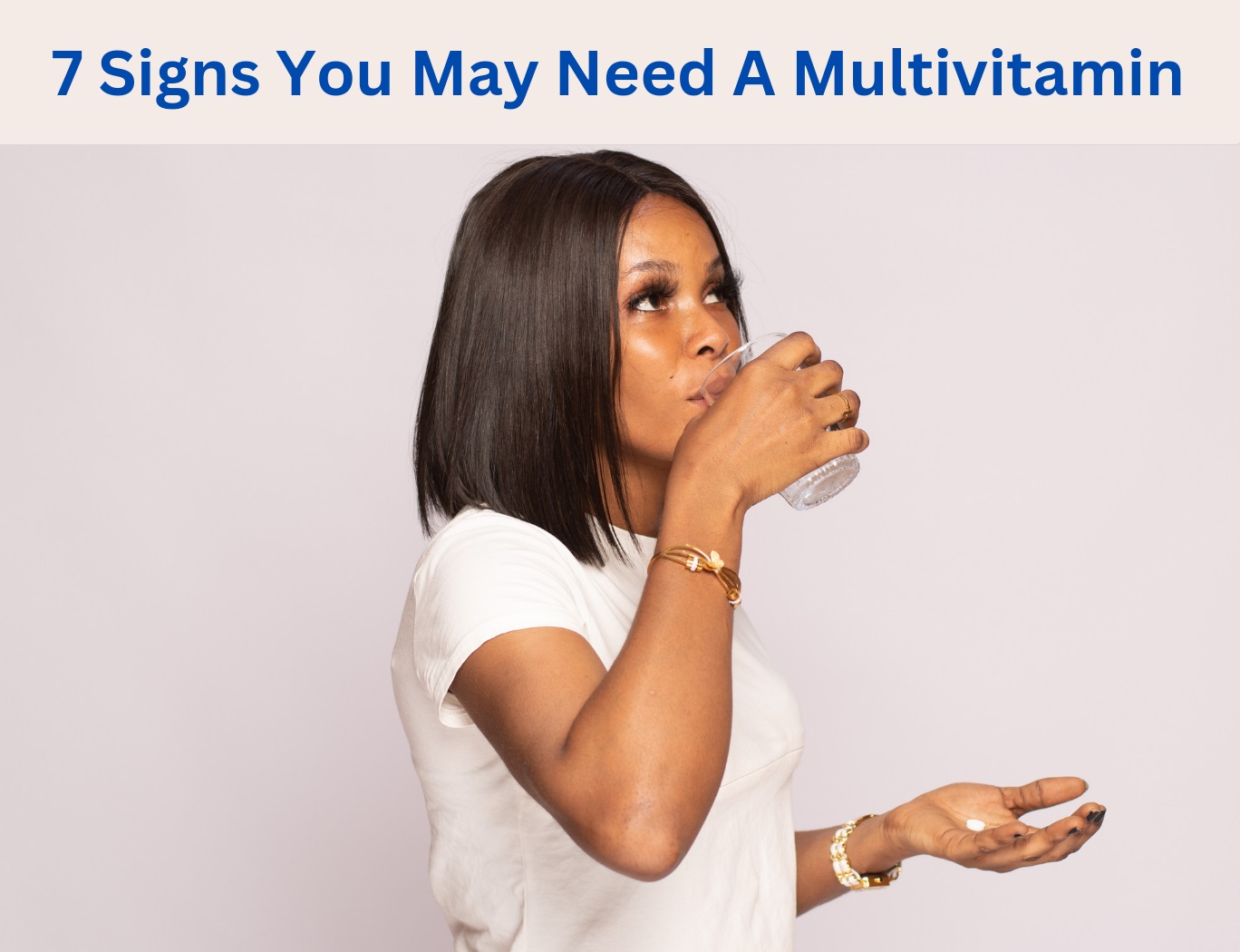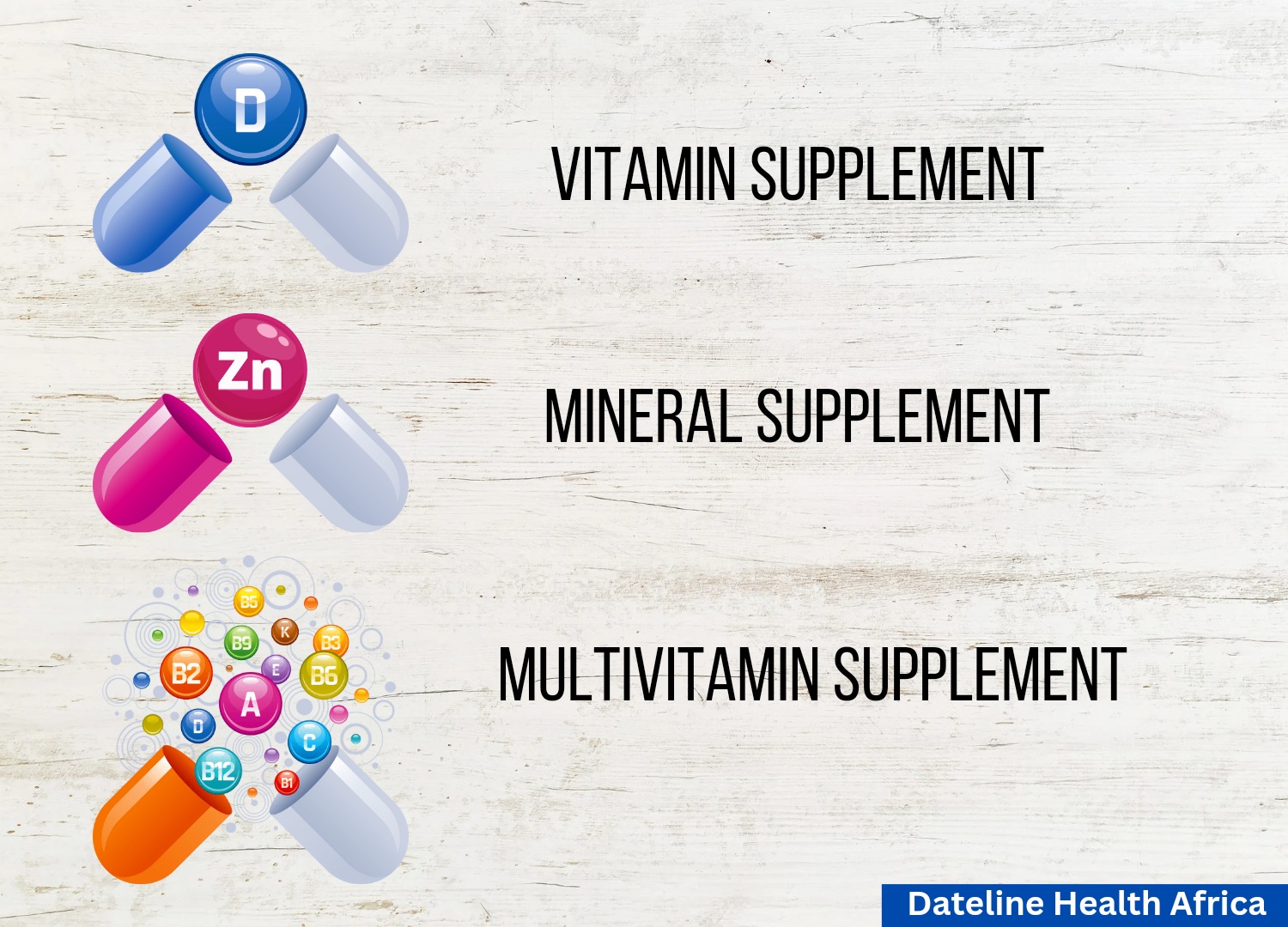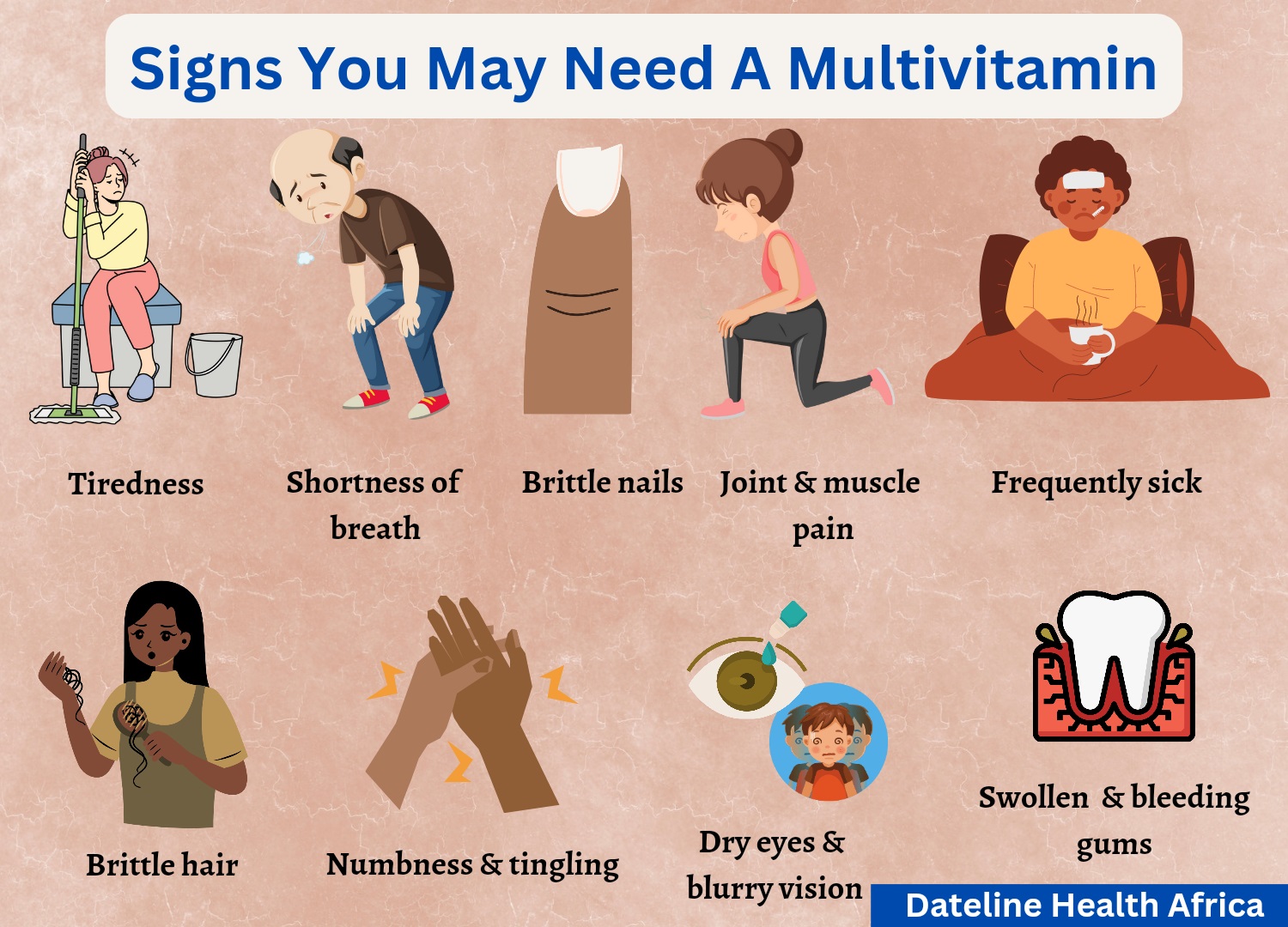
Image of a black lady taking oral tablets with water in a glass cup.
By: Victoria Iyeduala (Freelance Health and Wellness Writer)
"Vitamins and minerals are generally good for humans being constituents of healthy human cells. They, however, cause problems for humans when they become too much or too little in the body", says Dr Aderemi Teriba, former Director of Health Services at the University of Lagos and retired Senior Partner, Clapton Surgery, London.
Vitamins and minerals are essential nutrients your body needs to function correctly. Usually, you can get enough of the micronutrients you need from a healthy diet.
However, for some reasons, such as your lifestyle, health condition, allergies and financial capacity, you can't guarantee that your diet will provide all the necessary nutrients you need in sufficient amounts. This is where dietary supplements come in.

Image explaining the differences in the composition of supplements,
There are vitamin, mineral and multivitamin supplements. A vitamin supplement contains one specific vitamin. A mineral supplement contains one particular mineral. A multivitamin supplement is a combination of vitamins and minerals.
Vitamin and mineral supplements are used to treat one specific vitamin and mineral deficiency. You use multivitamins to supplement your overall diet.
Multivitamins support your diet, help you get adequate essential nutrients, and prevent micronutrient deficiency. Multivitamins are available in pill, liquid and powder form.
How do you know that you need a multivitamin?

Image explaining signs that may be vitamin deficient.
Falling sick more often than not? It could be a result of a lack of sleep or stress.
It could also mean that your body may lack sufficient nutrients. Inadequate amounts of vitamins C and E in your body weaken your immune system and make you more prone to infections.
It is easy to have vitamin C deficiency because it is a water-soluble vitamin and is easily lost from the body. It is also easy to get vitamin C because it is available in many fruits and vegetables.
Vitamin E is found in vegetable oils, nuts, seeds, fruits and vegetables.
Adjusting your diet to contain more food rich in vitamins C and E and taking an appropriate multivitamin can help strengthen your immune system and prevent infections.
Lack of sleep can make you easily get tired, but a nutrient deficiency can also be responsible. You may also notice you're short of breath after some exercise or a little hard work.
These are signs of anaemia. Anaemia can occur due to iron, folate (vitamin B9), vitamin B12 or vitamin A deficiency.
Taking the right multivitamin supplements and eating a healthy diet rich in iron, folate, and vitamins A and B12 can help alleviate the symptoms and prevent further damage.
Good sources of iron are organ meats (especially liver), red meat, beans, nuts, dried fruits, dark green leafy vegetables and iron-fortified foods.
It is also advisable to eat foods rich in vitamin C. Vitamin C helps your body absorb iron, and severe vitamin C deficiency can cause iron deficiency anaemia.
A good amount of folate is found in
Vitamin B12 is mainly found in animal-derived products such as meat, dairy products, eggs and fish. Other sources are foods fortified with vitamin B12.
Liver is very rich in vitamin A. Fruits, vegetables, dairy products, eggs, meat and fish are also excellent sources of vitamin A.
"When humans are vitamin deficient they pick up the warnings in their hair and nails which become brittle. Hairs can begin to fall off", says Dr Aderemi Teriba.
Brittle hair and nails is a common symptom of vitamin B7 (biotin) deficiency. This deficiency can make your hair thin and dry, causing hair loss. Your nails become rough-looking, soft, split or cracked.
Biotin deficiency is rare because biotin is readily available in many foods. Examples of vitamin B7-rich foods are
Deficiency in other B vitamins and other nutrient deficiencies such as calcium, iron and vitamin C deficiency can also cause brittle hair and nails.
Taking a multivitamin with your daily diet can help boost your body's nutrient stores and improve hair, skin and nail health.
If you notice that your gums are bleeding, you may think you've done a rough one on them while brushing. This may not be the case. It could mean you need more vitamin C in your body.
Vitamin C helps your body make collagen, which promotes healthy gums and aids wound healing. You could be vitamin C deficient if your wounds take longer than usual to heal.
Although there's enough vitamin C around because Africa has a large variety of fruits and vegetables, taking a daily multivitamin isn't out of place if you need more.
Too much exposure of the eyes to light from screens of electronic devices and the use of contact lenses are common causes of dry eyes and blurry vision. It could also happen if you're not getting enough vitamins A, E and B12.
A more obvious symptom of vitamin A deficiency is night blindness. A person with night blindness can't see clearly at night.
Vitamin A deficiency is common in Africa, especially among children and pregnant women.
Increasing your intake of vitamin A will improve or alleviate the symptoms of vitamin A deficiency. You can do this by adding more vitamin A-rich foods to your diet and taking a multivitamin containing vitamin A in the right amount, plus other nutrients that are good for eye health.
Vitamin D, calcium and magnesium are essential for healthy bones. When any or all of these nutrients are not sufficiently available in the body, you may experience muscle and joint pains.
Deficiency in vitamin D is a significant cause of calcium deficiency because your body absorbs calcium with the help of vitamin D.
Osteomalacia in adults and rickets in children are more severe vitamin D or calcium deficiency symptoms. This condition weakens and softens your bones which makes them break easily. It causes bone pain, poor growth in children and bone deformities.
The most abundant source of vitamin D is sunlight. Spending more time in the sun and taking a multivitamin containing vitamin D is a great way to increase your body's vitamin D.
Food sources of vitamin D are eggs, fatty fish (salmon, sardines, tuna, mackerel/scubia etc.), meat and vitamin D-fortified foods such as milk, cereals and drinks.
Calcium-rich foods include
Green leafy vegetables, whole grains, dark chocolate, soya beans, nuts, fish and meat are good sources of magnesium.
Dr Teriba points out that nutrient deficiency damages the nervous system, which causes your hands and feet to feel numb or tingle.
He says, "When people have vitamin deficiency, they get weak from muscle weakness, numbness and tingles when their nerves are affected."
A deficiency in B vitamins, vitamin E or calcium can cause damage to the nervous system. Adding the right multivitamin to your diet will increase your nutrient stores and can help repair nerve damage. It will also help you maintain a healthy nervous system.
When you notice these signs, your first response would probably be to run to a pharmacy shop and get a multivitamin. According to Dr Teriba, this shouldn't be the case.
He says, "the best place to get help is from your doctor, pharmacist, nurse or nutritionist. These professionals can test which vitamin you are deficient in or whether there is another underlying disease causing this deficiency and guide you on which vitamin supplements to take. It’s generally not good advice to go shopping for supplements or vitamins yourself but if you do then approach a pharmacist for guidance when you are in the store."
When you see a doctor, they'll run a blood test to know which micronutrients you're deficient in, how serious it is and if you need a multivitamin or vitamin supplements.
Vitamins and minerals are important to your body. You'll always see signs when you need more. Bleeding gums, brittle hair and nails, shortness of breath and joint aches are some signs of vitamin deficiency.
Ensuring you eat a healthy balanced diet and taking the appropriate multivitamin can help prevent these vitamin deficiencies and alleviate the symptoms.
When you notice these signs, the right thing to do is see a health professional to assess the symptoms and recommend your next course of action.
Related:
Vitamin supplements: Are they necessary to take?
Africa foods that are rich in vitamins.
Published: March 3, 2923
© 2023. Datelinehealth Africa Inc. All rights reserved.
Permission is given to copy, use and share content freely subject to attribution as to source.
DATELINEHEALTH AFRICA INC., is a digital publisher for informational and educational purposes and does not offer personal medical care and advice. If you have a medical problem needing routine or emergency attention, call your doctor or local emergency services immediately, or visit the nearest emergency room or the nearest hospital. You should consult your professional healthcare provider before starting any nutrition, diet, exercise, fitness, medical or wellness program mentioned or referenced in the DatelinehealthAfrica website. Click here for more disclaimer notice.